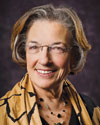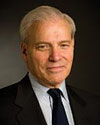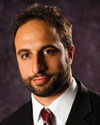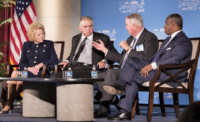Cutting through the din of rancorous partisanship in American politics isn’t easy, but the two-year-old National Transportation Policy Project has gathered high-level veteran public figures to state clearly and advance the cause of transportation programming.

HECKER
The project is part of the Bipartisan Policy Center, a Washington, D.C., non-profit organization—founded by former Senate Majority Leaders Howard Baker, Jr. (R-Tenn.), Tom Daschle (D-S.D.), Bob Dole (R-Kan.) and George Mitchell (D-Maine)—that offers policy recommendations on health care, energy, homeland security and other national topics. But with a six-year transportation reauthorization at hand but not yet on the legislative agenda and funding at a crisis point, the National Transportation Policy Project members have been particularly active, putting out several reports in the past two years.
“Transportation is not an end in and of itself,” says JayEtta Hecker, NTPP senior adviser. “It’s the key to energy and environment and sustainability and safety.”
The transportation project’s nearly 30 members include leaders from labor unions, executives, government, academia and energy. Member Chris Vincze, chairman and chief operating officer of TRC Cos., a Lowell, Mass.-based engineering consulting firm, says the group was formed to be geographically as well as politically diverse.
“We come from rural settings, metropolitan settings and from different politics,” he says. “Our mission is to make sure we coalesce around a good policy theme, not a partisan theme.”

FRANKEL
The group expresses a bipartisan sense of disappointment on the “lack of leadership” in Congress and the Obama Administration regarding transportation issues. “Since the Interstate was built, there has been no sense of national transportation goals,” says Hecker. “The consensus then was just to expand the highway system. There was no accountability about results.”
The project’s published recommendations emphasize a performance-based, results-rewarding approach to transportation programming. Some elements of the proposed new policy include:
- Focusing federal funds on national connections and metropolitan regions. Funds would flow directly to states on a mode-neutral basis for national systems of roads and rail.
- A funding program that distributes monies to areas with more than 200,000 people based on their share of the gross domestic product.
- A needs-based funding program for underserved, disadvantaged populations, both rural and urban.
- A bonus program that provides additional funds to states and regions based on demonstrated progress in meeting national goals, generally without dictating how those funds are to be spent.
The goal is to demolish the silos among the different modes of transportation, says Emil Frankel, NTPP director of transportation policy. “Our principle is mode-neutral on programs, not projects.”

SCHANK
Although the odds right now are daunting, the group eventually could wield the same kind of influence as the “blue dog” Democrats, who at times favor a bipartisan approach to fiscal and defense matters over straight-line party votes), says Tom Warne, a consultant and former Utah Dept. of Transportation chief. “The partisanship that exists in Washington today is absolutely smothering transportation, which heretofore had been bipartisan,” he says. “This group gets it. Right now, its voice isn’t being fully recognized for the value it has, but as people start gravitating toward solutions, you’ll find that what they were saying all along makes sense.”
One thing the group is saying is that the user-fee model for transportation “has been allowed to deteriorate,” says Joshua Schank, director of transportation research. “People are paying less and less to drive, yet [they] have the perception that they’re paying thousands in gas taxes.” While the group says its goal is not to provide specific funding recommendations, previous bipartisan Congress-appointed commissions have recommended an interim gas tax increase with a transition to a user-fee model, like charging for vehicle miles traveled.
Solutions like these aren’t politically palatable, says Warne. However, “We have smart people who have provided the solutions. It’s time to act and have the courage to implement them,” he says.


Post a comment to this article
Report Abusive Comment